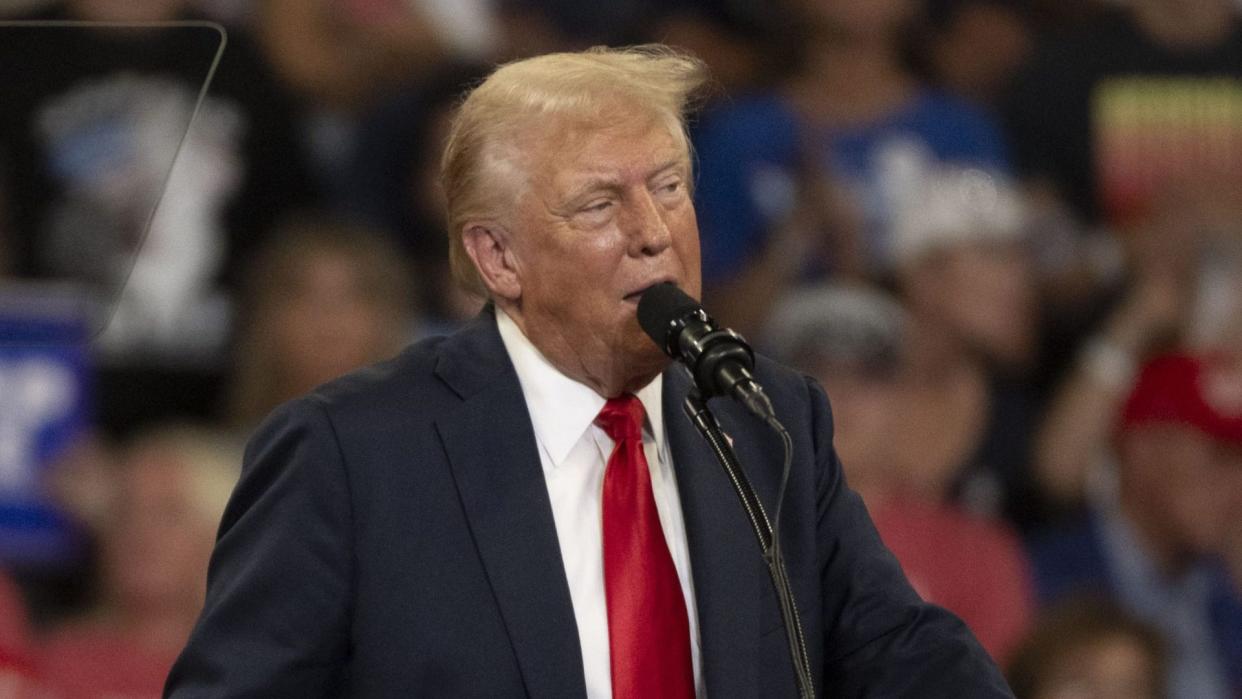5 Ways Trump’s Economic Policies Could Affect Your Grocery Bill If He Wins

Despite the inflation rate falling below 3%, food costs remain stubbornly high. Donald Trump has vowed that, if elected, he’ll bring down prices “very quickly.” However, CBS News reports that many Wall Street economists worry that his central policies — tariffs, tax cuts and an immigration crackdown — could have the opposite effect.
And they’re hardly alone.
Read Next: Trump Wants To Eliminate Income Taxes: Here’s What That Would Mean for the Economy and Your Wallet
For You: 9 Things You Must Do To Grow Your Wealth in 2024
“Donald Trump’s economic proposals for a possible second term may have a significant impact on both the cost of food and general inflation,” said Kris Mullins, a strategic consultant, investor and entrepreneur. As CMO of Capital Max, his consulting work involves the analysis of macroeconomic policy and its effect on everyday financial issues like inflation.
For Mullins, predicting what Trump might do is all about analyzing what he has already done. “Examining how he handled his initial term offers clues about possible effects on daily economic indicators in the future,” he said. With that in mind, here are some ways Trump’s policies could affect your grocery bill.
A New Trade War Could Make Imported Items More Expensive
Protectionist tariffs that increased the cost of imports were a hallmark of Trump’s first term. He has promised more of the same if re-elected — and the result could increase your supermarket bill.
“The trade policies implemented by Trump, particularly the tariffs imposed on imported goods, may still have an impact on grocery prices,” said Mullins. “If these measures continue or increase, they could result in increased expenses for imported food products, potentially causing a rise in overall grocery costs. This effect could be most strongly experienced in the food items that heavily depend on global supply chains, like fruits, vegetables, and seafood.”
Explore More: I’m an Economist: Here’s My Prediction for the Housing Market If Trump Wins the Election
You Might See Your Grocery Bill Rise by Nearly $100
The Center for American Progress concurs with Mullins’s assessment. Its own analysis found that a second Trump trade war would amount to a $90 tax at the grocery store, with the following items seeing the biggest price hikes.
Fresh fruit: 60% is imported, with grapes, bananas, avocados and berries in the top four.
Fresh vegetables: America imports 38% of the veggies you find in the produce aisle.
Coffee: Kona coffee from Hawaii is the only domestically produced variation, and it represents less than 1% of U.S. consumption.
Seafood: America imports 70% to 85% of its seafood and ranks only 18th among worldwide seafood producers.
Retaliatory Tariffs Could Force Domestic Growers To Raise Prices
A side effect of Trump’s protectionist trade policies is that target countries — most notably China — typically respond by slapping their own tariffs on U.S. products that they import.
According to the Tax Foundation, America’s agriculture industry took some of the biggest hits, with China imposing retaliatory tariffs of up to 25% on U.S.-grown products like soybeans and pork. As foreign tariffs made American food products more expensive for overseas consumers to buy, they stopped buying them. Some domestic producers saw their exports fall by more than 70%.
If a similar dynamic plays out in a second Trump term, growers in hard-hit states like Kansas, Illinois and Iowa could compensate for losses by raising prices on the products they sell domestically to U.S. grocery stores.
An Immigration Crackdown Could Starve Growers of Their Primary Labor Pool
In 2016, on the eve of Trump’s first election, the Iowa Agribusiness Radio Network predicted that Trump’s vow to crackdown on undocumented immigrants would lead to higher prices at the grocery store.
It wrote, “A deportation effort would take workers away from agriculture. Undocumented workers account for 67% of people harvesting fruit and 61% of all employees on vegetable farms, and as many as half of all workers picking crops. Agricultural economists say any interruption in the workforce would ripple throughout the food system. Some of the effects feared include farm bankruptcies, labor shortages and high-priced food items.”
Nearly a decade later, little has changed. Mass deportation of undocumented immigrants remains a major plank in Trump’s platform — and the target population remains at the heart of America’s growing operations.
According to the Baker Institute, undocumented workers represent 40% of the country’s agricultural labor force, as they have for the last three decades.
The Potential Impact on Overall Inflation Rates
Mullins worries that several of Trump’s proposed policies could force prices up not just at the grocery store but economy-wide.
“Trump’s support for reducing regulations and implementing fiscal stimulus through measures like tax cuts and higher government spending may lead to an increase in overall inflation rates,” he said. “Although these policies are intended to stimulate economic expansion, they could also result in an eventual rise in consumer prices. Continuing expansive fiscal policies without matching offsets could lead to increased inflationary pressures, which may impact all sectors of the economy. If Donald Trump is elected again, we could witness a continuation of policies that focus on aggressive fiscal stimuli and trade protectionism. Although they can briefly stimulate economic activity, they also typically raise import expenses, impacting food prices and fueling overall inflationary trends.”
Editor’s note on election coverage: GOBankingRates is nonpartisan and strives to cover all aspects of the economy objectively and present balanced reports on politically focused finance stories. You can find more coverage of this topic on GOBankingRates.com.
More From GOBankingRates
6 Subtly Genius Moves All Wealthy People Make With Their Money
America's 50 Fastest-Growing Suburbs With Home Values Under $500,000
I'm a Debt Expert: Here's How Social Media Warps Our Perceptions of Debt
This article originally appeared on GOBankingRates.com: 5 Ways Trump’s Economic Policies Could Affect Your Grocery Bill If He Wins





